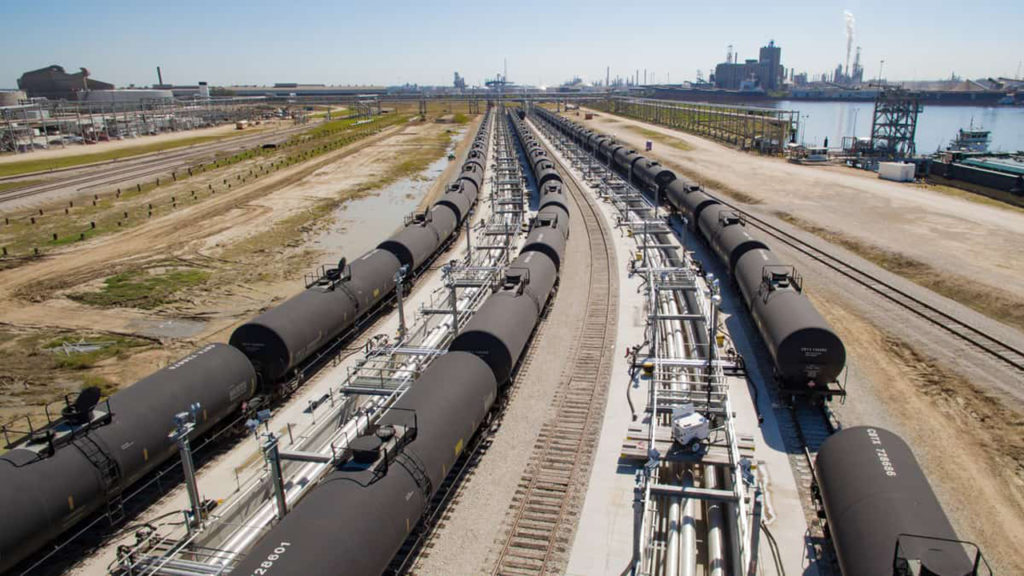
CP Issues 72-Hour Lockout Notice to TCRC-T&E
Written by Marybeth Luczak, Executive Editor
Canadian Pacific (CP) late on March 16 issued a 72-hour notice to the Teamsters Canada Rail Conference (TCRC)-Train & Engine of its plan to lock out employees on March 20, 2022 if the union leadership and the Class I railroad are unable to come to a negotiated settlement or agree to binding arbitration.
TCRC represents approximately 3,000 locomotive engineers, conductors, and train and yard workers at CP. The union on Feb. 10 reported that it was involved in a dispute with Class I railroad over wages, benefits and pensions; that it had served notice to Minister of Labor Seamus O’Regan Jr. in accordance with the Canada Labor Code; and that a strike vote would take place.
On March 4, TCRC announced that it had completed and tallied the results of a strike vote: There were 3,062 ballots sent out to the membership, with 96.7% “in favor of strike action if necessary.” The union said at that time it would continue to participate in the mediation process with the assistance of the Federal Mediation and Conciliation Service (FMCS); the next meetings were set to be held between March 11 and March 16.

On March 16, CP President and CEO Keith Creel said that the railroad issued the 72-hour lockout notice “with a view to bringing this uncertainty to an end.” He explained: “For the sake of our employees, our customers, the supply chain we serve, and the Canadian economy that is trying to recover from multiple disruptions, we simply cannot prolong for weeks or months the uncertainty associated with a potential labor disruption.”
CP reported that it has “been negotiating in good faith since September, and over the past week, [the railroad] and the TCRC leadership have been meeting daily with federal mediators to reach a new negotiated collective agreement in hopes of avoiding a labor disruption. Despite those talks, our positions remain far apart.”
According to CP, on March 15 it “tabled an offer that addressed a total of 26 outstanding issues between the parties, including an offer to resolve the TCRC’s key issues of wages, benefits and pensions through final and binding arbitration.” However, on March 16 “TCRC leadership rejected CP’s offer and, contrary to public statements by TCRC spokesman Dave Fulton that wages, benefits and pensions were the key issues, the union continues to table additional work rule demands,” CP said. “In rejecting our offer, the TCRC’s proposal included an even more onerous pension demand. The TCRC’s latest position would, if accepted, be even more destabilizing to the pension plan for all of CP’s unionized employees, not just the 10% who are TCRC members.
“For nearly a decade, CP has invited the TCRC to enroll its members in a sustainable pension-sharing program, which has benefited thousands of members of CP’s other Canadian unions. The TCRC has consistently rejected this opportunity, and has done so again today. In fact, the union leadership has taken the successful pension-sharing program off the table seeking to negotiate all pension changes through collective bargaining—an unfair demand that jeopardizes the long-term health of a pension plan that 30,000 other employees and pensioners rely on.”
CP reported that it has begun its work stoppage contingency plan and “will work closely with customers to achieve a smooth, efficient and safe wind-down of Canadian operations.”
Creel said that “CP will continue to bargain in good faith with the TCRC leadership to achieve a negotiated settlement or enter binding arbitration.”
TCRC spokesperson Dave Fulton said on March 16: “It was well known that CP was going to force a work stoppage and lockout our members. They have done just that. At the bargaining table, CP continues to dismiss our members’ demands and are unwilling to negotiate the issues they have created. We remain committed to reaching an acceptable agreement that addresses our members issues. Our members are fully engaged and will be ready in the event CP carries out the notice.”
The union noted that it is “committed to working with federal mediators and reaching a negotiated settlement. The union is willing to remain at the bargaining table until the March 20th lockout deadline and beyond.”
In 2021, a CP TCRC locomotive engineer earned on average C$135,442 and the top earner made C$209,773; a TCRC conductor, trainperson or yardperson earned on average C$107,872 and the top earner made C$182,888, according to CP. “Since 2007, the TCRC members have enjoyed a wage increase of 43%, which exceeds the compounded inflation rate by nearly 20%,” the railroad reported.
Minister of Labor Responds

Minister of Labor Seamus O’Regan Jr. late on March 16 issued the following statement regarding the collective bargaining negotiations between CP and the TCRC:
“Canadian Pacific Railway and the Teamsters Canada Rail Conference have been negotiating the renewal of their collective agreement and have been unable to reach an agreement so far. Today, the employer gave notice of their intention to lock out employees as of March 20.
“Our government respects and has faith in the collective bargaining process, because we know that the best deals are the ones reached by the parties at the bargaining table.
“The Minister of Transport, Omar Alghabra, and I understand the impacts of a potential work stoppage and are monitoring the situation closely. We are encouraged to see that both parties are still negotiating. We have been in touch with the parties directly, urging them to work together to resolve their issues and reach a deal as quickly as possible, and will continue to do so.
“The government strongly encourages both parties to consider making the compromises necessary to reach a deal that is fair for workers and the employer. Canadians have worked together throughout the pandemic to find solutions to our collective challenges. They expect the same from such actors in our national economy.
“The Federal Mediation and Conciliation Service has been working closely with the parties since December to help them reach an agreement and remains with them at the table to assist them in their negotiations.”
Shipper Groups Speak Out
Fertilizer Canada issued the following statement on March 17:
“Fertilizer Canada is calling on Canadian Pacific Railway (CP Rail) and Teamster’s Canada Rail Conference (TCRC) to commit to binding arbitration to mitigate impacts on the fertilizer supply chain from a rail work stoppage. A disruption to rail service will once again cripple Canada’s fragile supply chain and have devastating effects in the broader North American economy.
“CP Rail has issued a 72-hour notice that they will lock-out more than 3,000 TCRC union members who work as engineers, conductors, trainpersons and yardpersons. TCRC has also issued a 72-hour notice of a strike. This will be particularly devastating for the agricultural sector, as spring is a crucial season for seeding and farmers are counting on timely supply of fertilizer to maximize their crop yields.
“We are asking the federal government to do everything in their power to encourage both parties to enter into binding arbitration, and if necessary, be prepared to enact legislation to swiftly put an end to the work stoppage.
“A work stoppage compromises Canada’s position as a leading global fertilizer supplier and could result in fertilizer production facilities being forced to shut-in production, impacting Canadian workers, the economy, and food security. Our members, which include manufacturers of essential nitrogen and potash fertilizers, are already beginning to feel the impacts as preparation for a work stoppage begins.
“‘Fertilizer is the most important input for crops and is responsible for half of the world’s current food production,’ says Karen Proud, President and CEO of Fertilizer Canada. ‘While we respect the collective bargaining process, Canada cannot afford another disruption to our supply chain. With 75 percent of all fertilizer in Canada moved by rail, our members are critically dependent on rail service to move products across the country and into international markets.’
“There is no other alternative transportation method that currently has capacity or can be brought online in time to mitigate the impact of the work stoppage.
“Food security, domestically and internationally, relies on the Canadian fertilizer industry. The agricultural sector is already experiencing supply challenges compounded by the war in Ukraine and cannot withstand anymore disruption. The 2021 growing season saw lower crop yields due to weather conditions. Food security in Canada and internationally depends on maximizing crops this season and fertilizer is critical to this.”

The Grain Growers of Canada (GGC) released this statement on March 17:
“In response to news that Canadian Pacific Railway Ltd. has issued a lock out notice, effective March 20, 2022, to the Teamsters Canada Rail Conference, the Grain Growers of Canada (GGC) would like to express deep concern regarding the impact of a railway work stoppage on the agricultural supply chain.
“‘For grain farmers, the railways represent a lifeline,’ said GGC chair Andre Harpe from his farm in Alberta’s Peace Country. ‘This is the time of year when we receive critical deliveries of fertilizer and other inputs required to put a crop in the ground.’
“This news leaves Canadian farmers in a particularly vulnerable position. Many are still recovering from the effects from last year’s devastating drought. Coupled with the calamitous fallout from the war in Ukraine, Canadian farmers and their international customers require quick reassurance that a spring crop will go in the ground without delays caused by supply chain interruptions.
“‘Our members rely on this critical infrastructure to get our product to customers across Canada and around the world,’ added Harpe. ‘We also need to move what little grain our members may have left, following last year’s disappointing crop year, in order to support our cash flow for spring planting.’
“As this work stoppage deadline approaches, GGC is calling on the federal government to use any tool at its disposal to prevent a disruption from occurring. This could include encouraging the TCRC to agree to binding arbitration or the introduction of emergency legislation, if required.”
The Canadian Federation of Independent Business (CFIB) issued this statement on March 17:
“The Canadian Federation of Independent Business (CFIB) is deeply concerned about the potential upcoming work stoppage at Canadian Pacific Railway (CP) and its impact on Canada’s economy as small businesses are starting to recover from the pandemic and are dealing with supply chain issues.
“The timing could not be worse for our members.
“As many businesses rely heavily on rail services to send and receive their goods from Canadian and international suppliers, the work stoppage will further disrupt their operations and create more uncertainty at a time that is already challenging for many businesses. Currently, only 35% of businesses have returned to normal sales, while debt levels and share of businesses considering bankruptcy remain high.
“CFIB’s latest research shows 89% of small businesses are impacted by supply chain challenges, with retail, manufacturing, and construction businesses being the hardest hit sectors. Business owners are also seeing increased prices of their goods and services, delays in receiving shipment and an increased cost of shipping to customers.
“Three in ten business owners have seen their business’ costs increase by more than 20% due to supply chain issues, while 39% are waiting more than a month for shipments.
“The work stoppage will cause additional burdens on many of these businesses and put their future and the livelihood of their employees at a greater risk.
“CFIB is asking the federal government to make sure both parties stay at the negotiation table until an agreement is reached while rail services remain fully active.”

The Chemistry Industry Association of Canada (CIAC) released this statement on March 17:
“The Chemistry Industry Association of Canada (CIAC) urges the Government of Canada, Canadian Pacific Railway (CP) and Teamsters Canada to work together to prevent serious damage to the Canadian economy and keep critical goods moving in Canada.
“‘The compounding events of recent years (the pandemic, severe weather, global supply chain issues) have created a fragile supply chain in Canada. This work stoppage is yet another blow to Canada’s economic recovery and our reputation as a reliable supplier to global markets,’ said Bob Masterson, President and CEO of CIAC.
“‘Fully $31 million worth of industrial chemical products rely on CP’s network to get to their destinations every single day and the economic impact of a work stoppage is $1 million per day per facility that is shutdown. Some of those goods are also essential to core public services such as water treatment. We urge both sides to consider the far-reaching and urgent economic implications the work stoppage at CP will have on industry.’
“In many cases, chemical facilities are continuous operations that require reliable, uninterrupted rail service to produce and deliver essential products to customers. In the event of an interruption, they quickly run out of storage capacity and incur shortages for incoming raw materials.
“The impacts of a CP work stoppage are immediate, severe, and long-lasting as there are no viable alternatives for shipments. Many CIAC members are captive to CP’s network. Even those served by both CP and Canadian National Railway (CN) understand CN’s network is not in a position to take on much extra capacity.
“CIAC believes that a negotiated solution is always the preferred outcome. Should negotiations fail, however, the Government of Canada must be prepared to act quickly and in the national interest to order the parties to return to work and enter binding arbitration.”
Collective Bargaining Process Background
The FMCS provides the following information on the collective bargaining process:
- “The collective bargaining process begins with a notice to bargain, a written notification given by either the employer or the union requiring the other party to commence collective bargaining for the purpose of renewing or revising a collective agreement or entering into a new collective agreement. As soon as notice to bargain is given, it is the responsibility of the employer and union to negotiate in good faith.
- “If an impasses is reached or if the negotiations have not started within the time specified in Section 50 of the Canada Labor Code, either party may file a notice of dispute to the Minister of Labor.
- “In the event of a notice of a dispute which has been filed in full compliance as stipulated in section 6 of the Canada Industrial Relations Regulations, the Minister of Labor appoints a conciliation officer within 15 days to assist the parties in resolving their differences.
- “The conciliation officer has a 60 day mandate, but the parties may, if they both agree, request an extension of the time for conciliation. At the end of the conciliation period, a 21-day cooling off period begins.
- “During the cooling off period, the Minister of Labor can appoint a mediator to continue to assist the parties in reaching an agreement. During this time, parties acquire the legal right to strike or lockout. However, a legal work stoppage cannot take place until the 21 days have expired.
- “As a requirement to obtain the legal right to declare a strike or lockout, a 72 hours’ notice to the other party and to the Minister of Labor is needed. In addition, the union must obtain a strike mandate (60 days – section 87.3 of the Code) from its membership in order to commence strike action.
- “If need be, the Minister of Labor can refer specific issues to the Canada Industrial Relations Board (CIRB). For example, parties must have an agreement on the maintenance of minimal services during a work stoppage to prevent an immediate and serious danger to the safety or health of the public. Where they cannot reach such an agreement, the Minister of Labor may refer the matter to the CIRB for adjudication.
- “Another possibility is the appointment of an arbitrator to resolve outstanding issues, however both parties must agree.
- “In summary, parties may not exercise their right to strike or lockout until a notice to bargain has been given, the conciliation process has taken place, 21 days have elapsed since the end of the conciliation process, a strike vote has been taken, and a 72-hour strike notice or lockout has been given.
- “In rare instances, the period of the conciliation process (60 days) may be shortened by agreement of the parties or eliminated if the Minister decides not to appoint a conciliation officer, a conciliation commissioner or a conciliation board.
- “In rare instances, a strike or lockout may have such a significant impact on the public interest that back-to-work legislation or pre-emptive legislation is needed. Back-to-work legislation or special legislation has always been seen as a last resort.”



